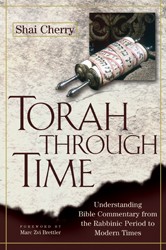After Everett Fox published his translation of the Torah [The Five Books of Moses (Schocken 1995), reviewed in Jewish Book World, Vol. 14 no. 1 (Spring, 1996), 7 – 8], Robert Alter commented that “Fox’s signal limitation is his monogamous attachment to the Hebrew, often at the cost of the English… What it lacks is an answering English sense for the stylistic elegance and precision, the sheer magic of words and sounds, of the ancient Hebrew” [The New York Times Magazine; October 22, 1995]. With the publication of Alter’s own translation of the Torah, readers can see what his singular combination of Hebraic scholarship and literary acuity has wrought.
The present work profits particularly from its chosen format of translation and commentary, which gives the author the opportunity to engage in an exegetical version of kere and ketiv by providing a different treatment of the text in each medium. For example:
* Ambiguous pronominal references can be retained in the translation while resolved in the notes. [Cf., e.g., Genesis 44:22 and 46:29.]
* Slavish fidelity to the Hebrew (as in the case of leitwörter) can be dispensed with in the translation and still called to the reader’s attention in the commentary. [Cf. Alter and Fox to Genesis 32:21.]
* Translations of rare or unusual words or expressions can be justified in the commentary without interrupting the flow of the narrative in translation. [Cf. the translation of ma’akhelet (Genesis 22:6) as “cleaver,” conjuring up an image far more terrifying than the ordinary “knife,” and accounting, therefore, for Isaac deliberately ignoring it in the very next verse!]
* Puns and other plays on words can be explained in the commentary without requiring the translation to perform stylistic acrobatics. [Cf. Genesis 4:25.]
* Translations made according to a proposed emendation of the text can be explained in the notes, along with the corresponding reference to the Massoretic version. [Cf. Genesis 10:10; Fox translated according to the Massorah and cites the emendation in a note.]
All in all, Alter was right. His own rendition of the Torah is more felicitous, Fox’s greater fidelity to the Hebrew often coming at the expense of literary felicity (cf. their respective translations of the poetic Deuteronomy 32), but I admire that greater fidelity and would not set it aside, per se.





